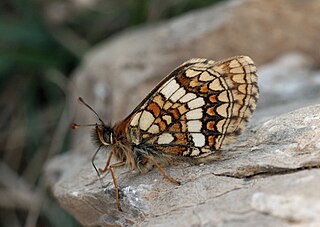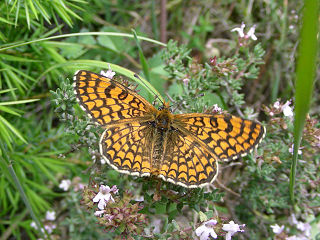
The green hairstreak is a small butterfly in the family Lycaenidae.

The purple-shot copper is a butterfly in the family of the Lycaenidae or copper butterflies and in the genus of the Lycaena.

Melitaea diamina, the false heath fritillary, is a butterfly of the family Nymphalidae.

Coenonympha oedippus, the false ringlet, is a species of butterfly in the subfamily Satyrinae. It is found in Austria, Belgium, the Netherlands, France, Hungary, Italy, Japan, Kazakhstan, Liechtenstein, Mongolia, Poland, Russia, Slovakia, Slovenia, Spain, Switzerland, and Ukraine. It is extirpated from Bulgaria, Germany, and Slovakia.

Parnassius tenedius, the tenedius Apollo, is an east Palearctic member of the snow Apollo genus (Parnassius) of the swallowtail family (Papilionidae). Populations range from Siberia and the Far East of Russia to the western Chukchi Peninsula, Mongolia and north China. The larva feeds on Corydalis species. In the northern part of its range it is a low altitude butterfly; further south it is montane.

The Lapland ringlet is a member of the subfamily Satyrinae of the family Nymphalidae. It is restricted to sunny patches in very damp spruce and pine forests and forested unmanaged peatlands. The larva feeds on various grasses and related plants and winters twice. A dry period in the habitat will result in the decline of the species.

Boloria dia, the Weaver's fritillary or violet fritillary, is a butterfly in the family Nymphalidae. The name Weaver's fritillary is in honor of Richard Weaver, an English insect collector who claimed to have obtained the specimen within ten miles of Birmingham around 1820. However, B. dia is very rare in England and the few specimens known from there are thought to be from possibly accidental introductions.

Boloria titania, the Titania's fritillary or purple bog fritillary, is a butterfly of the subfamily Heliconiinae of the family Nymphalidae.

Melitaea aurelia, or Nickerl's fritillary, is a butterfly of the family Nymphalidae. It is found in central Europe.

Melitaea didyma, the spotted fritillary or red-band fritillary, is a Palearctic butterfly of the family Nymphalidae.

Melitaea phoebe, also known as the knapweed fritillary, is a butterfly of the family Nymphalidae. It is found in the Palearctic realm, except the northernmost locations. It used to include Melitaea telona, recently revalidated as a distinct cryptic species.

Pseudophilotes baton, the baton blue, is a butterfly of the family Lycaenidae. It is found in central and southern Europe and then east across the Palearctic to the Russian Far East.

Melitaea varia, the Grisons fritillary, is a butterfly of the family Nymphalidae. It is found in the Alps at heights of 1,500–2,600 m (4,900–8,500 ft), especially in the Swiss cantons Valais, Engadin and Graubünden. It is also found in the Ortler region in South Tyrol, Alpes-Maritimes and Drôme in France, high areas of Tirol in Austria and high areas in the Apennine Mountains such as Abruzzo.

The pale stigma is a moth of the family Noctuidae. It is found in central and southern Europe, Turkey, the Caucasus, Armenia, Kazakhstan and from western Siberia to the Altai.

Erebia pandrose, the dewy ringlet, is a member of the subfamily Satyrinae of the family Nymphalidae. It is found from the Arctic areas of northern Europe, the Pyrenees, Alps, the Apennine Mountains, the Carpathian Mountains, Kola Peninsula and Kanin Peninsula, part of the Ural and the Altai and Sayan Mountains up to Mongolia.

Melitaea parthenoides, the meadow fritillary, is a butterfly of the family Nymphalidae. Note that the common name meadow fritillary is also used for the North American species Boloria bellona.

The Provençal fritillary is a butterfly in the family Nymphalidae. It is found in south-western Europe and North Africa. The range extends from the Iberian Peninsula to southern France and the Alps in Switzerland and Italy. It is also found in the Atlas Mountains.

Melitaea arduinna, or Freyer's fritillary, is a butterfly of the family Nymphalidae. It is found from south-eastern Europe across Asia Minor to central Asia and the Altai. The habitat consists of steppe-clad slopes.

Rapala arata is a small butterfly found in the East Palearctic that belongs to the lycaenids or blues family.

Euphydryas intermedia synonym ichnea is a small butterfly found in the Palearctic that belongs to the browns family. It occurs up to 2200 m above sea level.





















